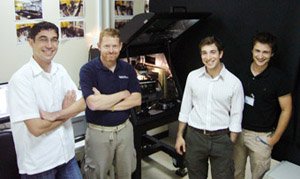Sep 1 2009
Asylum Research and the Masdar Institute of Science and Technology (Abu Dhabi, United Arab Emirates) announced today that the Institute's Laboratory for Energy and Nano-Science (LENS) has acquired Asylum's MFP-3D Stand Alone Atomic Force Microscope (AFM) and instrumented NanoIndenter to perform research aimed at improving the efficiency of thermoelectric materials and developing non-destructive tools for thin film characterization of photovoltaics.
 From left with the new MFP-3D Stand Alone AFM at the Masdar Institute: Amro Al Khatib, Keith Jones of Asylum Research, Dr. Aaron Schmidt, and group leader, Dr. Matteo Chiesa.
From left with the new MFP-3D Stand Alone AFM at the Masdar Institute: Amro Al Khatib, Keith Jones of Asylum Research, Dr. Aaron Schmidt, and group leader, Dr. Matteo Chiesa.
The Institute is the dedicated to the research and development of sustainable energy solutions. The MFP-3D-SA is a state-of-the-art atomic force microscope that will be used for three-dimensional measurements of different solid state materials at the nanometer scale. The MFP NanoIndenter is a true instrumented indenter and will be used to investigate the mechanical properties of nanostructures and for a unique frequency-domain thermo-reflectance experiment for measuring the thermal properties of homogenous materials and sub-micron thin films.
Commented Dr. Matteo Chiesa, Assistant Professor at the LENS, "After reviewing many instruments I chose the MFP-3D as the best AFM combined with the most elegant and simple-to-use nanoindentation tool. Asylum Research professionalism was a striking factor in choosing the right characterization tool. Asylum Research has shown a dynamic attitude in providing a complete solution for the needs of my laboratory, which is part of a new graduate university in a region where technical support can be very challenging."
Added Asylum Research CEO, Dr. Jason Cleveland, "We are proud that the MFP-3D has been selected by the Masdar Institute for Science and Technology, an exciting new research organization dedicated to the development of future energy solutions. We at Asylum Research are pleased to be a part of that research."
The Masdar Institute is the Middle East's first graduate institution dedicated to tackling the most important challenge facing our planet today - the need to develop cutting edge and sustainable energy solutions that will ensure the economic growth and prosperity of all nations while preserving the environment for future generations. The Institute is the product of the enlightened leadership of Abu Dhabi, which has made a substantial commitment to transforming the UAE into one of the key knowledge economies in the world. Masdar Institute has a strong relationship with the Massachusetts Institute of Technology, which has collaborated on the creation of the curriculum. The relationship with MIT will play a key role in the Institute's aim to become a world-class institution paving the way to a viable energy future for us all. The Masdar Institute is a key element of Masdar, a wholly-owned subsidiary of the Mubadala Development Company. The Masdar Institute will play a key role in engaging with the world's leading organizations in the area of renewable and sustainable energy. The recent award to Abu Dhabi and Masdar City of the headquarters of the International Renewable Energy Agency underpins the UAE's commitment to this global challenge and provides the Institute with an unparalleled opportunity to participate in shaping energy policy that will determine the future of our planet.
The Laboratory for Energy and Nano-Science (LENS) relies on the combination of unique experimental capabilities. One of the current research activities at LENS is aimed at improving the efficiency of thermoelectric materials, including understanding phonon distribution and developing material structures, e.g. nanowires, superlattices, and nanoscale precipitates that further reduce thermal conductivity below that achievable by alloying. Ongoing research has shown how nanoscale material interfaces hold the key to high-ZT thermoelectrics, and the need for improved understanding of transport across these interfaces in order to realize the full potential of thermoelectric technology. Mechanical characterization on different TE materials is also important to correlate TE transport properties with their mechanical properties in order to highlight valuable manufacturing paths. An in-depth understanding of this correlation is essential to the development of economically viable solutions that are not just based on trial and error.
A second research topic of relevance at LENS is related to the development of non destructive investigation tools for the characterization of thin films of interest for the photovoltaic industry. Thin film density and porosity represent important parameters that correlate with many of the optical and transport properties of thin films. Unfortunately, reliable and accurate density measurements are challenging and for this reason LENS relies on its unique experimental facilities to develop accessible characterization methods that will facilitate the development of new large scale production processes.